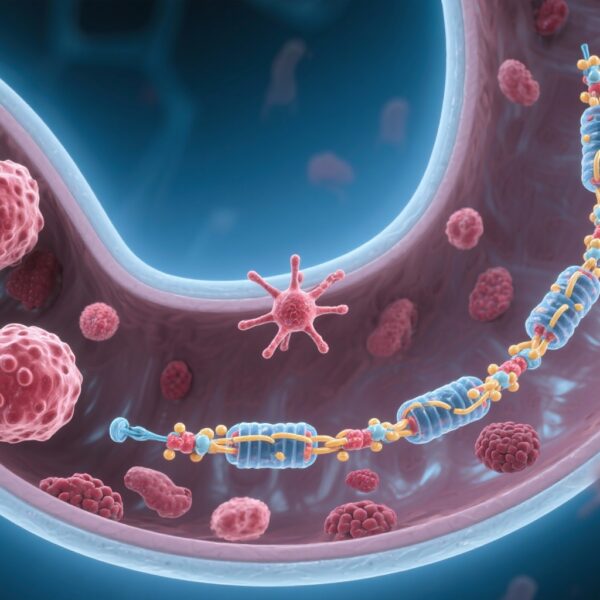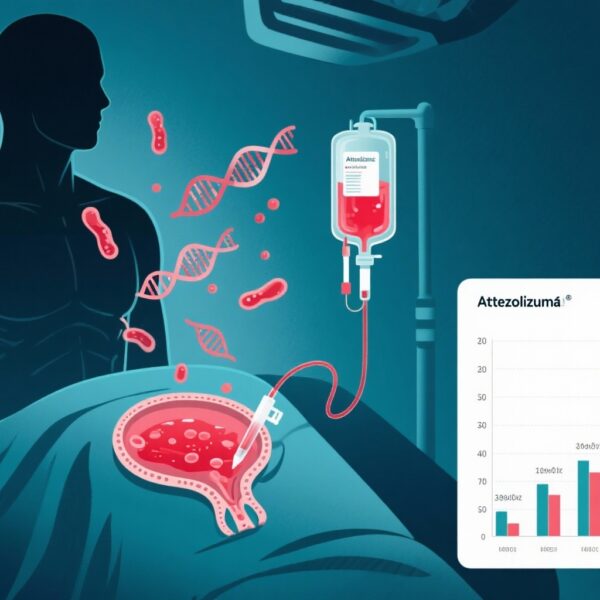Highlight
Belzutifan, a hypoxia-inducible factor-2α (HIF-2α) inhibitor, shows durable objective response rates in von Hippel-Lindau disease (VHL)-associated renal cell carcinoma after nearly 50 months of follow-up. The therapy maintains a favorable safety profile with no grade 4 or 5 treatment-related adverse events observed. These findings reinforce belzutifan as a systemic treatment option that may delay or obviate the need for surgery in this patient population.
Study Background
Von Hippel-Lindau disease is a rare autosomal dominant familial cancer syndrome caused by germline alterations in the VHL tumor suppressor gene. This disorder predisposes patients to multisystem neoplasms, notably clear cell renal cell carcinomas (RCC), central nervous system (CNS) hemangioblastomas, and pancreatic neuroendocrine tumors. RCC remains a leading cause of morbidity and mortality in VHL, posing a clinical challenge due to the propensity for multifocal tumors and the risk of metastatic progression.
Historically, the management of VHL-related RCC has centered on active surveillance for small tumors and surgical intervention when tumors grow beyond certain thresholds, usually around 3 cm, to mitigate metastatic risk. This approach, however, results in repeated surgeries with associated morbidity and risks to renal function. Systemic therapy options have been limited, and the pursuit of effective targeted agents with manageable toxicity profiles has been a priority.
Hypoxia-inducible factor-2α is a key driver in the pathogenesis of VHL disease-associated tumors due to its role in angiogenesis and tumor proliferation when VHL function is lost. Belzutifan is an oral HIF-2α inhibitor that gained approval following early clinical evidence of efficacy and safety in this setting.
Study Design
The LITESPARK-004 was a single-arm, phase 2 study conducted at 11 centers across Denmark, France, the United Kingdom, and the United States. Eligible adult patients diagnosed with VHL disease—confirmed via germline VHL mutation testing—and possessing at least one measurable renal cell carcinoma lesion were enrolled. Inclusion criteria mandated the absence of tumors larger than 3 cm meriting immediate surgery, no prior systemic anticancer therapy, no metastatic disease, and an Eastern Cooperative Oncology Group (ECOG) performance status of 0 or 1.
Participants received oral belzutifan 120 mg once daily continuously. The primary endpoint was the proportion of patients achieving an objective response in VHL-associated RCC lesions as per RECIST v1.1 criteria, based on assessment by an independent review committee. The trial was non-randomized, with no comparator arm, and recruitment ceased once the target sample size was achieved. The present report delivers results with a median follow-up nearing 50 months.
Key Findings
Sixty-one participants were enrolled from May 2018 through March 2019, with a median age of 41 years. The cohort was nearly evenly split between males and females and predominantly White (90%). At data cutoff in April 2023, 59% of participants (36/61) remained on treatment, highlighting sustained tolerability and patient adherence over long-term therapy.
The objective response rate (ORR) for VHL-related RCC was 67% (41 of 61 patients), with 11% (7 patients) achieving complete responses and 56% (34 patients) partial responses. These response rates were maintained over nearly 50 months, indicating durable antitumor activity.
Safety data indicated that treatment-related adverse events (TRAEs) were mostly mild to moderate. Grade 3 TRAEs occurred in 18% of patients, including anemia (11%), fatigue (5%), urinary tract infection (2%), hypoxia (2%), and blister formation (2%). Notably, no grade 4 or 5 TRAEs were reported. Serious TRAEs were rare, affecting only 7% (4 patients), including single events of anemia, urinary tract infection, intracranial hemorrhage, and hypoxia.
Overall, the safety profile supports the feasibility of long-term administration of belzutifan in this population, with manageable hematological and non-hematological toxicities.
Expert Commentary
The updated LITESPARK-004 results confirm belzutifan’s role as an effective systemic therapy option for VHL-associated RCC, with an impressive ORR and durable responses that potentially alter the therapeutic landscape by minimizing the need for repeated surgeries. As a first-in-class HIF-2α inhibitor, this therapy addresses the underlying molecular pathogenesis of VHL tumors, representing a paradigm shift from conventional surgical management.
Limitations of this study include its single-arm design and relatively small, homogenous patient sample, which may affect generalizability. However, in the context of a rare genetic disease with limited therapeutic options, these findings are highly impactful. Future investigations could focus on combination strategies, longer safety monitoring, and effects on other VHL-associated neoplasms such as CNS hemangioblastomas and pancreatic neuroendocrine tumors.
Mechanistically, inhibiting HIF-2α disrupts hypoxia-driven oncogenic signaling, curtailing tumor angiogenesis and proliferation. The absence of serious off-target toxicities aligns with the selective inhibition profile of belzutifan, reinforcing its biological plausibility and clinical utility.
Conclusion
The nearly four-year follow-up of the LITESPARK-004 study establishes belzutifan as a safe and efficacious systemic therapy for patients with VHL-associated renal cell carcinoma. Its durable responses and manageable adverse event profile signify an important therapeutic advance, offering a non-surgical alternative for tumor control. This long-term data supports greater integration of belzutifan in standard care algorithms for VHL disease and highlights the promise of targeted molecular therapy for hereditary cancer syndromes.
Funding and ClinicalTrials.gov
This study was funded by Merck Sharp & Dohme, a subsidiary of Merck & Co., Rahway, NJ, USA, in collaboration with the Intramural Research Program of the National Institutes of Health, National Cancer Institute Center for Cancer Research, and a grant from the National Cancer Institute. The trial is registered under ClinicalTrials.gov identifier NCT03401788.
References
Srinivasan R, Iliopoulos O, Beckermann KE, Narayan V, Maughan BL, Oudard S, Else T, Maranchie JK, Iversen AB, Cornell J, Perini RF, Liu Y, Linehan WM, Jonasch E. Belzutifan for von Hippel-Lindau disease-associated renal cell carcinoma and other neoplasms (LITESPARK-004): 50 months follow-up from a single-arm, phase 2 study. Lancet Oncol. 2025 May;26(5):571-582. doi: 10.1016/S1470-2045(25)00099-3. Epub 2025 Apr 12. Erratum in: Lancet Oncol. 2025 Jul;26(7):e349. doi: 10.1016/S1470-2045(25)00354-7. PMID: 40228516; PMCID: PMC12050119



